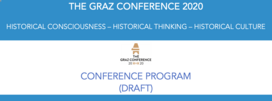IV – The core concepts in their interrelation to ‘historical learning’
In some communities, the sprouting interest on empirical research and on theoretical debate about the ontological and/or social dimensions of ‘historical consciousness’ and ‘historical thinking’ in relation to ‘historical learning’ was somehow overlapped in the new millennium by a growing normative discourse on historical learning, e.g. the requested ‘historical competences’ of the pupils, students and their teachers. Actual results of innovative empirical studies on ‘historical learning’ and/or ‘historical reasoning’ in the classroom might contribute to lift the discourse from its normative bonds. Other communities opted for elaborating pragmatic aspects (and the logics) of ‘historical thinking’.
Questions of interest:
- How to conceptualize ‘historical sense-making’ – including self-reflection and identity-building – in a transnational perspective?
- Do concepts such as ‘education for active citizenship education’ have a meaningful epistemological/ontological relation to ‘historical learning’ in a transnational perspective?
- How to conceptualize aspects of ‘historical thinking’ in the postmodern age?
- How to relate discourses on ‘historical culture’ to ‘historical learning’?
- How to strengthen analytic and theory-based forms of ‘historical learning’ for the daily practice of history didactics/ historical education?
- What is the role of first order concepts in the actual debates of ‘historical learning’?
Further differentiation and debate is also needed on the (im)balance between intention and practice in the various fields and applications of ‘historical learning’. To give the example: From the very beginning of the debate in the 1970ies and 1980ies there existed a dichotomy in the pragmatic use of ‘historical consciousness’: While in the practical application by history education a/o history instruction in school, the concept was – and to a large extent is still – used commonly as a construction of ‘historical consciousness’ with the goal of developing primarily the ‘collective national memory’, the ‘historical consciousness of the nation state’ at hand, – the theoretical discourse, which was based in philosophical, anthropological or sociological theories, oscillated between self-reflection and identity-building of the ‘social subject’ and a relatively vague definition of a collective historical identity/memory, without taking sufficiently into account the intersubjective dimensions of the concept, the communicative, socio-psychological and/or the performative aspects in the construction of ‘historical consciousness’.
Questions of interest:
- How to conceptualize ‘historical learning’ in a transnational perspective?
- How to further elaborate historical consciousness a/o historical thinking in their relevance for ‘historical learning in intercultural perspective’?
- How to teach controversial issues without ‘just’ producing ‘subjective’ and/or ‘relativist’ historical thinking?
- Can constructivist, communicative a/o organizational theories widen the scope of empirical research on the interrelation between core concepts and the teaching and learning practice in schools, universities or teacher education institutions?
Conference Office
Alois Ecker
Institute of History
Heinrichstraße 26/II
8010 Graz
Institute of History
Heinrichstraße 26/II
8010 Graz
Benjamin Ecker
Institute of History
Heinrichstraße 26/II
8010 Graz
CONFERENCE OFFICE
grazconference2020(at)uni-graz.at
+43 699 19221739
Bettina Paireder
Alois Ecker
Benjamin Ecker



